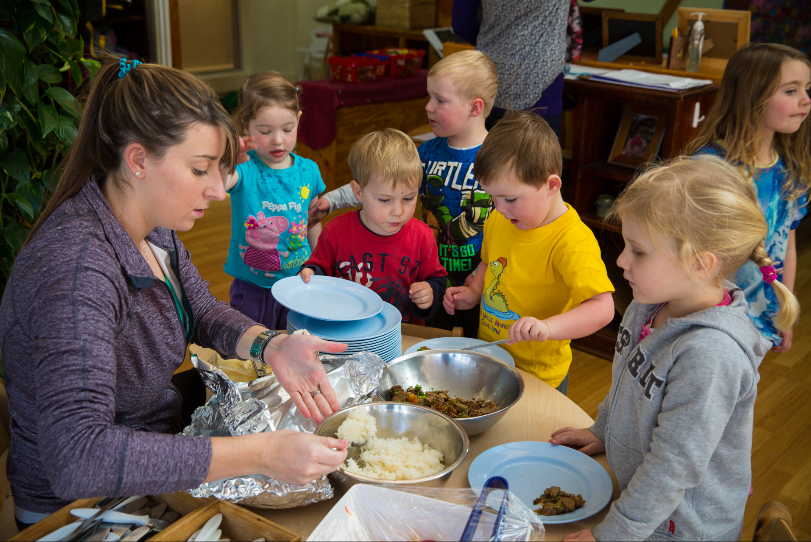Routines are a big part of our lives. They give us order and stability and the reassurance that comes from reliable, consistent patterns of activity. They support us to regulate our lives in a world that is often fast-paced and busy. And they provide a framework for ensuring the important ingredients for staying healthy, for maintaining a strong sense of wellbeing and a sense of purpose.
For quality-assured resources on independent learners:
ROUTINES AND TRANSITIONS: EMBRACING OPPORTUNITIES FOR LEARNING
This ECA Learning Hub module will introduce you to ways of seeing and using routines and transitions to highlight their enormous potential for learning and enrichment.
RETHINKING ROUTINES: OPPORTUNITIES FOR LEARNING
This resource encourages all those who live and work with young children to think deeply about routines, and to see the potential and possibilities for teaching and learning in these moments that are often prime times for extending thinking and connection.
Routines are important for adults, and they are also important for children.
Routines in the lives and experiences of young children weave their way throughout each day—they play a significant part in their living and in learning. In fact, routines, and all the rituals and rhythms that are involved in carrying them out, can seem to take up most of the day!
Meal, sleep and rest times, nappy changing and toileting, managing personal hygiene and self-care activities; transitioning from one part of the day to another are all routines that children experience. They often occur at the same time every day, and are carried out in the same way. The everyday nature of caregiving routines can result in them being overlooked as times which offer enormous potential for enriching children’s lives and providing meaningful opportunities for engagement and learning.
Young children are born to learn. They enter the world wired up to explore with energy, enthusiasm and creativity through their play and relationships with others. Children’s exploration and learning is not restricted to particular parts of the day, activities or experiences.
Children learn continuously through every first-hand experience that touches their lives. It is often in seemingly ordinary moments that the most significant learning can take place. Routines are just such times. They offer opportunities to:
- extend thinking, problem-solving skills and language development
- build close and respectful relationships
- support wellbeing and a sense of belonging
- encourage children’s independence and autonomy
- support connectedness and a strong sense of identity.
Routines provide rich opportunities for making children’s competence visible and for celebrating efforts and achievements together.
When routines are seen and understood as important within the lives and learning of children, they become a natural part of the learning environment. The National Quality Standard supports this understanding:
Educators are actively engaged in children’s learning and share decision making with them. They use everyday interactions with children during play, routines and ongoing projects to stimulate children’s thinking and to enrich their learning (ACECQA, 2011, p. 124).
Routines help us provide the consistency that is important for children to feel safe and secure. It is important that routines are implemented in a way that is flexible and responsive to both individual children and to the group. This way, routines can be used to support children in their learning rather than disrupting valuable and enjoyable play experiences. Interrupting a child in the middle of an absorbing play experience can cause frustration or confusion, and perhaps even prevent them from getting totally engaged in subsequent play.
In the toddler room at Halifax St Children’s Centre, the children are invited to be a part of every moment of the routines that occur each day. This is particularly the case at lunch time. Children collect crockery and cutlery from the kitchen, clean the tables, prepare face washers and set the plates and glasses around the table. They fill bottles with water and pour it into each other’s glasses. They help with serving the meal to themselves and to their friends as well as helping with cleaning up afterwards. The educators who work with and alongside the children recognise the value in these times. They offer the children the opportunity to be involved in every aspect of the lunchtime routine. This takes time—often a lot of time! Lunch time for this group of two-year-old children takes an hour or so each day. The educators know that when given enough time, the children are able to fully participate and grow a sense of connection and empowerment as well as many skills in taking care of themselves and others. The educators also see the children developing understandings in numeracy as they match place settings and chairs, count how many plates are needed and explore concepts such as full and empty and so on. Lunch time is a valued routine for the adults and children alike.
Managing routines with care and thoughtfulness so that they become a treasured part of the day opens the way to building places for children that are rich in potential for meaningful engagement and strong, secure relationships. These are great places to be and to belong.
Routines are so much more than simply routine!
This blog was developed as a part of Karen Winderlich’s ECA Learning Hub module, ‘Routines and transitions: Embracing learning opportunities’, now available for purchase or as a part of an Annual Learning Hub subscription.












You are right it is so easy to forget these parts of our day that make up so much of it.
Thank you for the reminder to slow this part down.